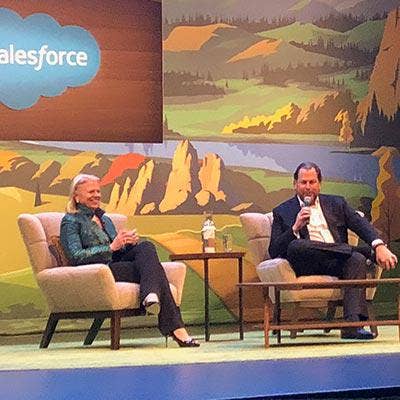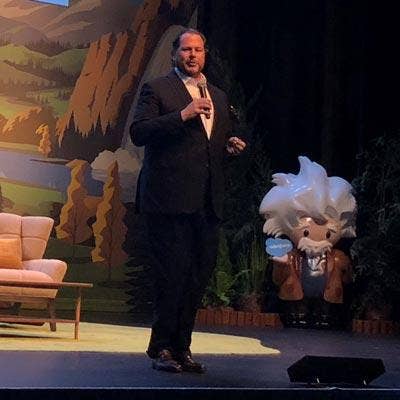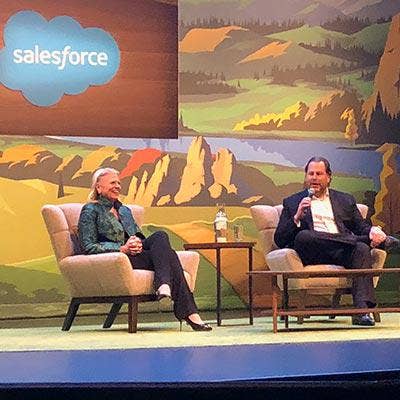Dreamforce 2017: 13 Revelations About IBM And CEO Ginni Rometty

Rometty And Benioff Discuss The Future Of Data, AI, And The Changing Workforce
Two of America's pre-eminent CEOs sat down at the Dreamforce conference to discuss how their companies will safely introduce to the world cutting-edge technologies like artificial intelligence.
Salesforce's Marc Benioff played the part of interlocutor, discussing many matters, both professional and personal, with IBM's Ginni Rometty.
As the relationship between the two enterprise technology companies escalates rapidly -- IBM wasn't even present at last year's Dreamforce -- they need to work together to make sure the advent of AI doesn't displace people and harm their ability to make a living, the CEOs agreed.
"It is our job to usher that safely into this world," Rometty told attendees.
They also shared thoughts on other social and gender issues.
"Ginni, you have become the top female CEO in the world. There's no doubt in my mind," Benioff told IBM's leader, who just arrived on an overnight flight from Brazil to the mega-conference in San Francisco.
Benioff later remarked, "This is amazing, what's happening between our companies."
Here's what we learned from their discussion.

Rometty Didn't Find Inspiration Working As An Engineer For An Auto Company
After graduating Northwestern with a degree in computer science and electrical engineering, IBM's future CEO took a job with an auto company working on buses and trucks.
"While it was lovely and I worked hard," she said, the position quickly taught her the difference between a job and a career. For the people around her, "This was just work for them."
"This is interesting … but," Rometty said in describing the experience.

Rometty's Husband Arranged Her IBM Interview
Rometty took her first job at IBM 36 years ago on the suggestion of her husband. He saw she was frustrated in her current position at an auto company, and reached out to a friend's father who worked for Big Blue to make an introduction.
Rometty said at the time IBM wasn't making professional hires, but her ability to convert banks from Burroughs Corporation systems to IBM landed her a job.

Rometty Learned An Important Lesson On Gender When Offered A Promotion
Ten years into her career, a supervisor at IBM wanted Rometty to replace him in a position he thought she was well-qualified for, but she had doubts about her readiness.
After the supervisor persisted about the promotion, Rometty told him, "I don’t think I'm ready for it." She added, "I need to go home. … I need to think about it and I want to talk to my husband."
When that conversation happened, Rometty's husband asked, "Do you think a man would have answered it that way?"
"I said, 'no,'" Rometty said, realizing her mistake. "I went in the next day and took the job."
She acknowledged to the supervisor she felt she handled the situation poorly. He agreed and said, "Don’t do it again."

While Their Partnership Is New, IBM Influenced Salesforce's Core Values
IBM and Salesforce share 5,000 common customers, the CEOs noted.
Only in the past year, however, did they begin advancing a partnership centered around their respective artificial intelligence platforms, Watson and Einstein.
"IBM's core values have influenced many companies, including ours," Benioff told Rometty. Big Blue has always prioritized a mission of doing what's good for society, and Salesforce's founders took that lesson to heart.
"With values, it's what you do when no one's looking," Rometty added.

Data And Bias
Data is "the issue of our age," Rometty said.
But the increasing significance of data across the business landscape raises all sorts of complicated questions about how tech companies manage and protect that unique asset for their customers, and how they help customers formulate decisions by applying artificial intelligence.
To allow AI to thrive, companies that develop the technology must make transparent to the public what data sets their algorithms have been trained on, and who trained them, Rometty said.
"You can train bias if you're not careful," she warned.

No To Government Surveillance
Companies like IBM and Salesforce have a responsibility to make clear to customers: "Your data is yours, not mine to give away," Rometty said.
Same goes with artificial intelligence. "You own the insights, you own the algorithms," she said.
IBM is the only major tech company that can claim it has never turned over customer data to a government surveillance program, she said.

IBM Called Watson 'Cognitive' Partly To Avoid Negative Connotations Around AI
The word "cognitive" doesn't exactly roll off the tongue, Rometty acknowledged.
But there are so many negative connotations around artificial intelligence, she said, that IBM in part chose the term to sidestep fears around the technology, and its potential to displace human workers.
While there are many legitimate concerns, fearmongering around the impact of artificial intelligence is mostly misguided.
New technologies have changed the nature of the workforce in all eras.
"Some jobs go away, new ones come," she said.

Primacy Of Data Could Be Advantage For Established Companies
The potential of leveraging historical data to yield insight means the current era could see a market dynamic that favors longstanding businesses, Rometty said.
"If you have a past, it just might be your advantage now," she explained. "You'll become a learning organization. You'll make better decisions."

Preparing For The Changing Workforce
A recent study IBM conducted with MIT found that technology will likely eliminate only 10 percent of the jobs that exist right now. But 100 percent of jobs will change in this era, Rometty said, citing that study.
That's a good thing, Rometty believes.
Yes, jobs are going to change, she told Benioff. "But we can prepare the world for that."
"I don’t think there's any company doing more than IBM in workforce development," Benioff said.

The 'Singularity' Is 'Decades And Decades' Away
Futurists have long predicted an ominous event called "the singularity."
That's the point, they predict, when artificial intelligence will become so capable that it will run away from its creators and on its own start developing more and more advanced technology.
Rometty says not to worry -- at least not yet.
The singularity is still "decades and decades away," she said.
"We know cause we're building this stuff," IBM's CEO added. "It is far away."

The Dark Side Of Quantum Computing
IBM already offers a 17-qubit quantum computer on its cloud.
The technology one day will solve problems that even the high-performance computers of our current era can't finish calculating. The first important applications will be in drug discovery, material science and other problems that today can only be approximated, but not truly modeled.
"There's also a dark side of quantum," Rometty warned. Within several years, quantum computers will be able to break almost all the encryption that exists right now.
Big Blue won't release a quantum computer until it has solved that problem.
"While working to build it, we're working on the antidote," Rometty said.
IBM won't reveal what that "antidote" to quantum code-breaking will look like, but she assured the audience her company won't release a powerful technology until it knows it can control its negative consequences.

Blockchain, Pork and Mangoes
"Blockchain will do for trusted transactions what the internet did for information," Rometty predicted.
The technology offers the unique ability to conduct transactions "between people who do not like each other, do not trust each other," she said. "They don’t need to if done properly."
That can solve some unique and currently intractable problems for society.
IBM is currently working on 500 blockchain projects. One of them, initially launched with Walmart and now involving 20 of the world's largest food producers, is about improving food safety, and eliminating food waste, by tracking meat and produce all the way from producer to retailer.
That project, which helps precisely identify foods that have been tainted, started with pork and mangoes.

Technological Acceleration
Benioff asked Rometty if things are truly "going faster than ever before?"
Is the broad acceleration of technology that people perceive real?
It is, she said, and that's largely because of the cloud.
"Back in time, there would be one major technology happening at a time," Rometty said.
But now new technologies like artificial intelligence, quantum computing and blockchain are coming at society so rapidly "because we're putting them in the cloud," she said.